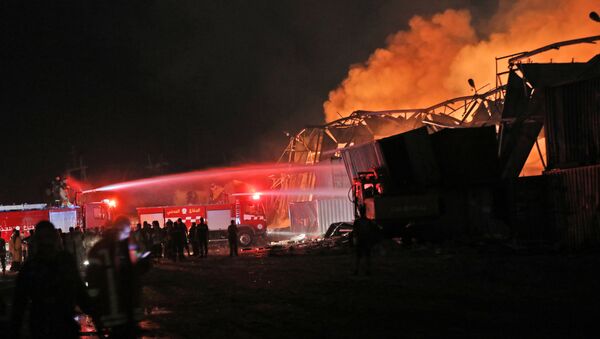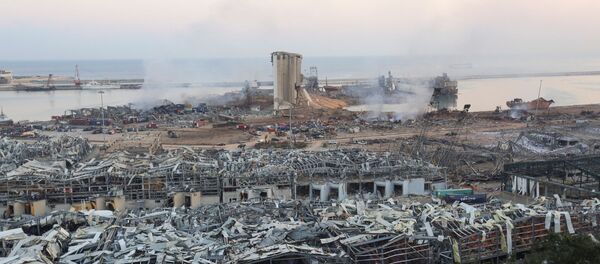Even with the Lebanese PM having already announced that a huge stockpile of ammonium nitrate in the port of Beirut as being behind the tragic explosion, a lot of speculations are continuing to circulate, suggesting other explanations for the deadly incident. Some of them come from conspiracy theorists, while others are being pushed by prominent politicians.
Here are the main theories and speculations about the cause of the deadly 4th of August explosion:
Official Version:
- The Lebanese authorities believe that a fire in one of the port's warehouses or maintenance work involving welding probably ignited some 2,750 tonnes of agricultural fertiliser - ammonium nitrate. The latter had reportedly been in the port since it was seized in 2014, with Lebanese media reports suggesting conditions in the warehouse were far from being optimal for a fertiliser that can become volatile and explode.
- Soon after the explosions took place a photo emerged purportedly showing workers welding a warehouse door next to half-tonne bags of ammonium nitrate, with netizens suggesting it was this type of behaviour that could have led to the disaster. The authenticity of the photo has not been confirmed, but some signs point to it possibly depicting the warehouse that was seen emitting smoke just ahead of the deadly blast.
Here is the technical data sheet for Nitropril, the brand of Ammonium Nitrate depicted in the above image.
— The Intel Crab (@IntelCrab) August 4, 2020
Very potent explosive. pic.twitter.com/vzlRY0pBwY
- Despite being a strong oxidizer, ammonium nitrate can't just catch fire and explode - it needs to be contaminated, for example with metal powders, after which it becomes combustible and highly explosive. In this state, burning ammonium nitrate can emit a brown smoke akin to that seen rising from the blast's epicentre in Beirut right after the explosion.
Other Popular Speculations:
- Even as evidence points towards the ammonium nitrate theory, other politicians have offered different explanations for the incident. US President Donald Trump alleged that the explosion might have been caused by a "bomb" of some kind, calling the 4 August events a "terrible attack". POTUS said that he based his allegations on the opinions of "some of our great generals" citing their expertise in the matter.
- The possibility of domestic tensions being behind the explosion also crossed people's minds and some in the media as well. The New York Times recalled that the country went through a 15-year civil war which ended 30 years ago and claimed that fears of a possible return of violence are on the rise following the explosion.
- One of the first speculations to emerge in the aftermath of the explosion was to blame Israel, suggesting an attack on a possible Hezbollah arm depot in the port. However, not only did Israel deny being responsible in any way, but Hezbollah itself denied that the explosion was caused by a detonation of its weapons.
- Wild conspiracy theories also entered the fray, with some netizens spreading rumours that Beirut was actually hit by a nuclear blast, which were only fuelled by the city mayor's calling the explosion a tragedy similar to the Hiroshima bombing. The online media outlet Vice reported that former ESPN reporter Chris Palmer was among the most influential social media users to spread the rumour in a now-deleted tweet, along with several conspiracy theorists. So far, there has been zero evidence to support the idea that it could have even been a small nuclear device that detonated.
Despite the abundance of speculations around the cause of the explosion that claimed the lives of at least 80 people, injured thousands, and left up to 300,000 homeless, it's probably a good idea to follow the advice of Abbas Ibrahim, the head of Lebanon’s general security service, not to speculate on the matter until all the facts are known and wait for the results of the official probe. Especially in light of a statement by the Lebanese president calling on the country's authorities to conduct an urgent investigation into the Beirut blast to determine who was responsible for it.






